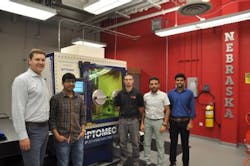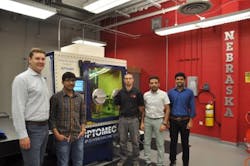Additive manufacturing system to develop dissolvable metal medical components
Metal additive manufacturing systems maker Optomec (Albuquerque, NM) has unveiled details of how the University of Nebraska-Lincoln (UNL; Lincoln, NB) is using a LENS Hybrid Controlled Atmosphere System to develop dissolvable magnesium components that will have broad-reaching implications in the design and manufacture of next-generation medical implants. The work will enable 3D-printed, patient-specific implants with controlled time to dissolve, eliminating the need for second surgeries and thus also reducing risks, costs, and suffering for patients.
"Our research is focused on advancing the performance and functionality of dissolvable devices," says Dr. Michael Sealy, an assistant professor of mechanical and materials engineering at UNL and a pioneer in advanced manufacturing research. "Using LENS, we are applying a hybrid additive manufacturing process to control the disintegration of medical fasteners and plates so they stay intact long enough to serve their purpose and then degrade away once the bone is healed."
The University of Nebraska-Lincoln uses the LENS Hybrid Controlled Atmosphere System to develop next-generation dissolvable medical implants. (Courtesy: Optomec)
Currently, medical implants—such as plates and screws—are made of titanium or stainless steel, which are permanent structures that often have high complication rates and require a second surgery for removal.
Powdered metals such as magnesium, titanium, and other reactive materials must be processed in a controlled atmosphere environment where oxygen and moisture impurities are maintained below 10 parts per million (ppm). Sealy used the system to process these materials in a way that addresses a key scientific challenge: how to maintain the strength and integrity of a degradable implant long enough for it to do its job. Partnered with Sentient Science (Buffalo, NY), Sealy is also investigating innovative hybrid processing techniques of 7000 series aluminum for the U.S. Navy.
The system enables Sealy and his team to couple Optomec's LENS deposition technology with layered surface treatments to print 3D metal components in magnesium with controlled degradation. The ability to control disintegration of a structure is a highly sought-after design capability not only for applications in orthopedics, cardiology, and urology, but also for other applications areas such as lightweight aerospace and automotive structures.
For more information, please visit www.optomec.com and engineering.unl.edu/neat.

